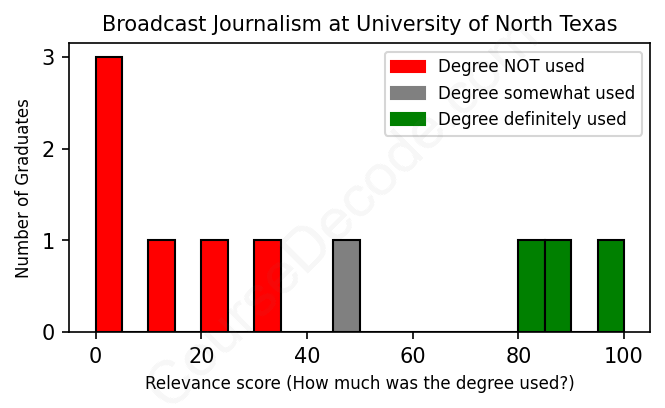
First, some facts. Of the Broadcast Journalism graduates from University of North Texas we've analyzed , here's how many have used (or NOT used) their degree in their career:

These are estimates based on AI analysis of 10 LinkedIn profiles (see below).
The verdict? Bad. Overall, with an average relevance score of 38%, Broadcast Journalism graduates from University of North Texas have a substantially lower likelihood (-29%) of finding work in this field compared to the average graduate across all fields:
And for comparison, here's the chart for all profiles we've looked at across all degrees.
Also, after graduating, only 20% of these graduates have pursued further education other than another Bachelor's degree (such as a Masters degree or other), compared to the average across all profiles of 35%. This suggests a Bachelors degree is enough for most Broadcast Journalism graduates, and it's normal to look for work straight after graduation.
See the details:
|
Relevance score: 30% We think this person has NOT gone into a career related to their degree. We think this person has NOT gone into a career related to their degree.
DEGREE INFOGraduated in 2021 from University of North Texas with a Bachelor's degree in Broadcast Journalism. No other secondary education since. JOB HISTORY SINCE GRADUATIONRecruiter Midesto Aug 2021 - Oct 2021 Leasing Agent  Asset Living Oct 2021 - Oct 2022 Special Education Assistant  GCISD Oct 2022 - May 2023 Registered Behavior Technician  Action Behavior Centers - ABA Therapy for Autism Jun 2023 - Present ABOUTNo information provided. |
The top 10 most common jobs done by the graduates we've analyzed (ranked most common to least) are:
After analyzing the job profiles of individuals who graduated with a degree in Broadcast Journalism from the University of North Texas, it's clear that many have ventured into various fields that don't directly align with their degree. A significant number of graduates have taken on roles in education, marketing, and communication, such as being a teacher or working as a communications specialist. While some of these positions can utilize skills gained from a journalism background, like effective communication and storytelling, they often stray away from the core of what Broadcast Journalism is about, which is mainly news production and reporting. For example, roles in program management, office management, and even as a recruiter focus more on operational and administrative tasks rather than the journalistic skills they learned in school.
However, there is a bright side! A handful of folks did land jobs that are closely related to their studies, like being news reporters, anchors, or production interns. These roles directly apply the principles of Broadcast Journalism and show that the degree can lead to fulfilling career paths in media. Still, the overall trend indicates that many graduates are finding themselves in jobs that either slightly touch on journalism or are unrelated altogether. This suggests that while a Broadcast Journalism degree can provide valuable skills, the job market may not always offer direct opportunities in the field, leaving graduates to explore a broader range of careers.
Here is a visual representation of the most common words in job titles for Broadcast Journalism graduates (this is across all Broadcast Journalism graduates we've analyzed, not just those who went to University of North Texas):

So, looking at the career paths of graduates from the University of North Texas with a degree in Broadcast Journalism, it seems like there's a mix of experiences. Right after graduation, many of them land internships or entry-level roles in media. For instance, some graduates took on internships at local TV stations or were involved in news production, which is pretty much what you'd expect for someone entering the broadcast field. However, as time goes on, it appears that not all of them stay in the traditional broadcasting or journalism roles. Some have shifted to roles in marketing, communications, or even education, which isn't exactly what you'd expect from a Broadcast Journalism degree.
If we look five to ten years after graduation, a lot of these individuals seem to have moved into various administrative or specialized communication positions, and in some cases, they’ve pivoted to entirely different fields. For example, one graduate ended up as a high school teacher, and others moved into project management or marketing roles that aren't closely related to journalism. On the flip side, there are also a few who have remained in broadcasting and even secured positions as news anchors or reporters, showing that there is a potential for a successful trajectory in media if that's where your passion lies. Overall, while some are doing well in related careers, it seems like a number have ventured off into different industries, so it might be a mixed bag depending on the individual’s goals and opportunities!
Getting a Bachelor’s degree in Broadcast Journalism at the University of North Texas—or really anywhere—can be a bit challenging, but it’s not impossibly hard. You'll dive into a mix of practical skills like video editing and reporting, combined with writing and theory. It requires a good amount of creativity and time management because you're often juggling deadlines, projects, and maybe even internships. The coursework can vary; some subjects might feel like a breeze, while others could stretch your comfort zone a bit. Overall, it leans toward being average in difficulty—you'll have to put in the effort, but if you love media and storytelling, you'll likely find it rewarding and engaging!
Most commonly, in the LinkedIn profiles we've looked at, it takes people 3 years to finish a Bachelor degree in Broadcast Journalism.
Looking at these Broadcast Journalism grads from the University of North Texas, it's a mixed bag in terms of financial success. The earlier graduates, especially those in teaching and program management roles, likely started out on the lower end of the pay scale common for those jobs—teachers generally don’t make a killing right off the bat. However, roles like "Diversity, Equity, and Inclusion Culture Lead" and "Senior Consultant, Communications" indicate a climb up the ladder, which can bring in better salaries. The more recent graduates seem to be taking on entry-level positions or internships, which typically don’t pay very well initially. Overall, while some have likely landed decent financial spots later on, it seems many started slow, aligning with the overall trend in journalism and related fields where you often have to work your way up!
Here is a visual representation of the most common words seen in the "about" section of LinkedIn profiles who have a Bachelor degree in Broadcast Journalism (this is across all Broadcast Journalism graduates we've analyzed, not just those who went to University of North Texas). This may or may not be useful:

Here are all colleges offering a Bachelor degree in Broadcast Journalism (ordered by the average relevance score of their Broadcast Journalism graduates, best to worst) where we have analyzed at least 10 of their graduates:
| College | Score | Count |
|---|---|---|
 Penn State University Penn State University
|
66 | 32 |
 Arizona State University - Walter Cronkite School of Journalism and Mass Communication Arizona State University - Walter Cronkite School of Journalism and Mass Communication
|
64 | 11 |
 University of Maryland College Park University of Maryland College Park
|
60 | 10 |
 University of North Texas University of North Texas
|
38 | 10 |